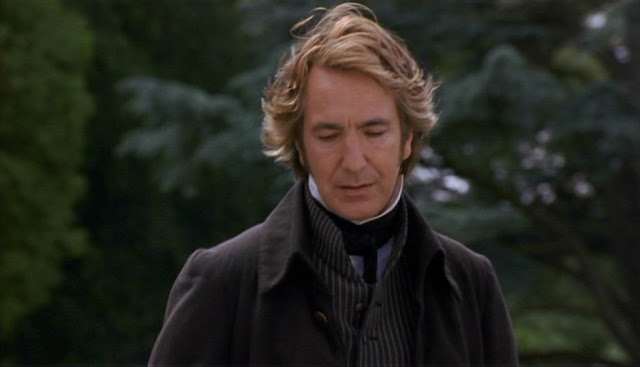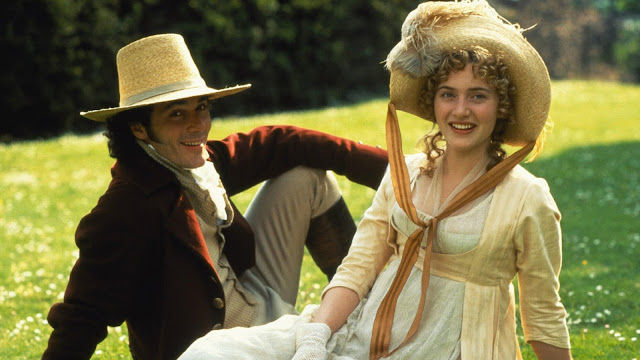Whenever I think of Jane Austen, I always fall back on my favorite of her novels, Pride and Prejudice. To date, it is the only one of her novels that so engaged me that I have read it multiple times, and the 2005 adaptation ranks amongst my favorite period-piece romances. Sense and Sensibility has always been one of those books that I just could never quite sink my teeth into, primarily because I never gave it a chance to win me over. With Pride and Prejudice, I saw the film first and came to the novel through that. Not so with Sense and Sensibility, as until recently, I had never seen any adaptation of it and was going into the novel with no preconceived notions of the characters and their little dramas. Now that I have had the chance to not only see this film but to examine it with a critical eye, I may take another stab at the novel.
Ang Lee directed this adaptation of the book. In many ways, Ang Lee reminds me of Michael Curtiz, as the two do not seem to really have anything that sets them apart as directors. Both have made amazing movies, but there isn’t anything that makes their movies stand out as theirs. You can usually tell if a movie is directed by Steven Spielberg, Stanley Kubrick, or Christopher Nolan. These directors have a strong sense of style that can be felt regardless of subject or genre. This tone is so strong, in fact, that when Spielberg directed A.I.: Artificial Intelligence, a film being developed by Stanley Kubrick before his sudden death, the film ended up being a tonal mess because the two directors have very different styles that clashed.
Ang Lee is what we refer to as a Jack-of-all-trades, able to handle just about any style of film, and his filmography reflects that. But he doesn’t put a stamp on any of them that calls attention to them being one of his films. This is not a negative. Some of his films are absolutely gorgeous to experience. Life of Pi has a strong narrative and visual flow. Crouching Tiger, Hidden Dragon has some breathtaking visuals and storytelling that were virtually unmatched in 2000, so much so that when the sequel finally materialized, without Lee at the helm, it lacked much of what made that film so special.
Looking at films like Crouching Tiger, Hidden Dragon and Life of Pi, it’s hard to see that the same director also helmed Sense and Sensibility. That is no sleight on any of these films or the director; these are all amazing pictures. But they do not feel like the same person made them. That is one of Ang Lee’s charms as a director; his ability to disappear behind the camera and make something special without having to mold it into something that could be branded as an Ang Lee film. This allows the film to exist on its own level and just be what it is: a Jane Austen costume drama.
The story, like most of Jane Austen’s prose, is about a close-knit family of daughters, in this case the Dashwoods. When Mr. Dashwood (Tom Wilkinson) dies, his wife (Gemma Jones) and three daughters — Elinor (Emma Thompson), Marianne (Kate Winslet), and Margaret (Emilie François) — are left with a small inheritance of only £500 a year. The bulk of his estate goes to his son, John (James Fleet), and his wife, Fanny (Harriet Walter). While John is inclined to share his father’s wealth, as he was instructed to by his father on his deathbed, Fanny uses her control over him to keep that from happening, and the two install themselves in the large house.
While there, Fanny invites her brother, Edward “Eddie” Ferrars (Hugh Grant), to stay with them, but frets when it becomes obvious that Eddie is growing fond of Elinor. Believing he can do better, Fanny does whatever it takes to prevent romance from developing. Eddie, who is shy and unassuming, has a secret that could prevent him from ever seriously being with Elinor: many years prior, he agreed to marry Miss Lucy Steele (Imogen Stubbs), a promise that he has come to regret. As he is a man of honor, he cannot bring himself to break off this engagement, though.
Mrs. Dashwood and her three daughters relocate to a cottage gifted to them by Sir John Middleton in Devonshire. There they meet Colonel Brandon (Alan Rickman), a dashing older man who falls in love with Marianne at first sight. But she has fallen for the younger, more suave John Willoughby (Greg Wise), a man who seems perfect and returns her affections equally. Hearts are broken, twists in the narrative conspire to bring the two eldest Dashwood daughters to the men they are destined to marry, and it all wraps up in typical Jane Austen fashion. The only real surprises are how it all comes together, not that it came together.
There is a smooth narrative flow to the whole affair that keeps this film moving to what we can all expect will be the inevitable conclusion. This is largely due to the excellent script crafted by leading actress Emma Thompson. At the time, she became the first person to get Academy Award nominations for both her acting and her writing, winning solely for the writing. While technically she is credited as the leading actress, it is really Kate Winslet’s story that drives the narrative. That doesn’t take anything away from the character of Elinor, though, as it is her that has the biggest challenge. Elinor falls in love with the nervous and ill-speaking Eddie but has her heart dashed when she learns of his secret engagement, so secret that even his family is unaware of it. She is very cagey with her emotions, only allowing them to overflow on two occasions: when she learns of the engagement and, later, when Eddie comes back to see her in the final act. That second moment really cements our endearment with this character and makes us love her all the more.
Marianne is the emotional half of the two; the Sensibility to her sister’s Sense. She lives by her emotions and allows them to dictate her every decision. This leaves her open to being taken advantage of by Willoughby, who, good intentions or not, is not ultimately a good man and, should he have married her, would have tired of her quickly. Facts matter not when this is explained to her, and she is quickly fallen into despair. Her emotions almost cost her her life as she collapses outside Willoughby’s home in the cold rain and nearly dies from the sickness that follows. Following this is the one weakness I found in the film’s narrative. We never see her falling in love with Colonel Branden. We get his affections for her; that scene when he first sees her and is mesmerized tells us all that we need to know about his feelings. But the film spends little time developing her feelings for him. It feels shorthanded and is a bit unsatisfying.
I don’t usually associate Hugh Grant with awkward and shy. Usually, he is the cocky, overconfident romantic lead, especially at this point in his career. But he is excellent in this rather understated performance. His best moment is his last when he arrives at the cottage to see Elinor and explain himself. It starts out so awkward, but his confidence grows as the conversation goes on. By the time he is proclaiming his love for her, he is a much different man than the one who started that scene. The transition is so deliberate and nuanced that we don’t notice it has happened until it is complete. When Elinor realizes what he is saying to her, her emotions get the best of her, and she cannot help but weep hysterically. She has kept it bottled up for most of the film, years perhaps, but can no longer do so.
This is a beautiful love story with twists and circumstances that betray that this is Jane Austen. While I will always prefer Pride and Prejudice, Sense and Sensibility is a close second. These books are akin to each other in so many ways while having their own distinct flavors. Ang Lee deserved to be recognized for this at the Oscars, but that honor wouldn’t be bestowed on him for another eleven years when he won for Brokeback Mountain and again for Life of Pi, both films that ultimately didn’t win the best picture after winning for the director. Even without winning Best Picture, this is a film that is a real feather in his cap and one that manages to hit you hard in the feels. The story of love and heartbreak will always be relevant and is refreshing to see when so many films anymore prefer to be either generic or cynical.
Academy Award Nominations:
Best Picture: Lindsay Doran
Best Actress: Emma Thompson
Best Supporting Actress: Kate Winslet
Best Writing (Adapted Screenplay): Emma Thompson (won)
Best Cinematography: Michael Coulter
Best Costume Design: Jenny Beavan and John Bright
Best Original Dramatic Score: Patrick Doyle
____________________________________________________
Release Date: December 13, 1995
Running Time: 136 minutes
Rated PG
Starring: Emma Thompson, Alan Rickman, Kate Winslet, and Hugh Grant
Directed By: Ang Lee









Comments
Post a Comment